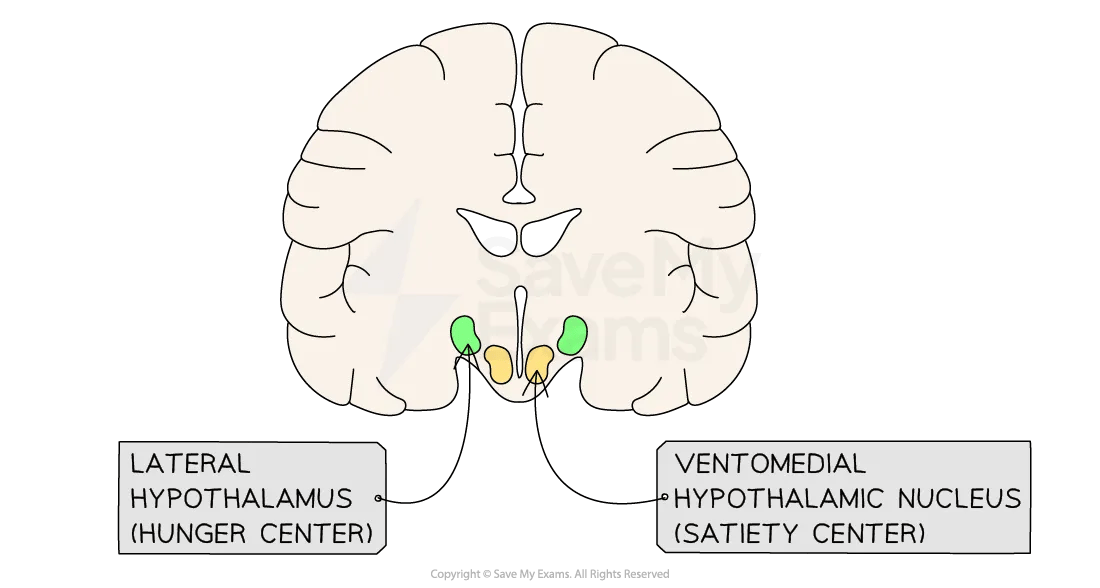- Ghrelin is a hormone secreted from the lining of the stomach, whose concentration in the blood falls after each meal and rises progressively until the next meal
- Thus the amount of ghrelin in the bloodstream is a marker of how long since the individual last ate and as it rises, so appetite increases
- The emptier the stomach, the more ghrelin is released, which is then detected by receptors in a part of the hypothalamus called the Arcuate nucleus
- The arcuate nucleus then sends signals to the lateral hypothalamus to secrete the appetite stimulant neuropeptide Y
- At the same time, ghrelin signals the pituitary gland to release growth hormones
- Ghrelin is known to be an appetite stimulant in humans and research has found that when given intravenously, it causes a short-term increase in the amount of food eaten (Malik et al, 2008)
- Leptin is a hormone produced from fat cells and released into the blood to signal to the hypothalamus that calorie storage is high (in the form of fat deposits)
- The hypothalamus receives the message from leptin that calorie storage is high and therefore appetite decreases
- However, when people are dieting or do not have enough to eat, fat is used up and fat cells stop producing leptin, causing leptin levels in the blood to fall
- The hypothalamus detects the drop in leptin and generates the sensation of hunger, stimulating an individual to eat more
- Leptin inhibits ghrelin in two ways: it reduces ghrelin secretion in the stomach and suppresses ghrelin receptors' expression in the neuropeptide Y system, therefore preventing the appetite-stimulant effect of ghrelin and neuropeptide Y

When we finish a meal, our glucose levels are high, and our ghrelin is low.
Research which investigates the role of neural and hormonal mechanisms in eating behaviour
- Nakazato et al (2001) found that ghrelin injections stimulated feeding and increased weight gain in normal rats and rats genetically deficient in growth hormone, demonstrating the important role of ghrelin in promoting eating and releasing growth hormone
- Shiiya et al (2002) found that ghrelin levels were lower in obese people and higher in those with anorexia than in normal weight participants, supporting theory of ghrelin as an appetite stimulant
- Licinio et al (2004) conducted research into a rare genetic condition in severely obese people who were unable to produce leptin naturally, but who, after a four-month period of leptin-replacement therapy, experienced weight loss of more than 40% and a reduction in food intake of almost half
Evaluation of the role of neural and hormonal mechanisms in eating behaviour
Strengths
- Understanding the neural and hormonal mechanisms controlling eating behaviour has real-word application in offering treatment possibilities for obesity, as we better understand the complex interactions between the nervous system and the hormones regulating eating
- Research using injections of ghrelin has shown that it stimulates appetite and research using leptin-replacement therapy shows that leptin suppresses appetite, supporting the theory of the role of these hormones in eating behaviour
Weaknesses
- Neural and hormonal mechanisms are only part of the complex systems regulating eating, as other factors such as biological rhythms also affect eating behaviour, shown by the fact that rats become most active and start to eat after dark, regardless of when they last ate (Kraly et al, 1980)
- Leptin injections have not been a universally effective treatment for obesity, so this means that research needs to investigate leptin further and identify if it is really useful for weight loss or might be better in preventing weight gain, suggesting there is more to understand about how leptin works
Link to Issues & Debates:
The role of neural and hormonal mechanisms in eating behaviour is a nomothetic approach proposing that because humans share similar physiology then eating behaviours will be universally governed by the hypothalamus, and leptin and ghrelin secretion. This ignores the individual complexity of decisions around food and cannot explain either obesity or eating disorders. A more idiographic approach might acknowledge the role of hormones but would also look at if a hormonal imbalance occurred after the disordered eating or the development of obesity or was really a contributing cause of these eating behaviours. It would also try and explain individual differences in eating behaviours that the role of neural and hormonal mechanisms cannot explain.
Link to Approaches:
The role of neural and hormonal mechanisms in eating behaviour is a biological approach to behaviour, explaining appetite, eating and satiety through the neural and hormonal mechanisms of the hypothalamus, including the lateral hypothalamus, ventromedial hypothalamus and arcuate nucleus.



